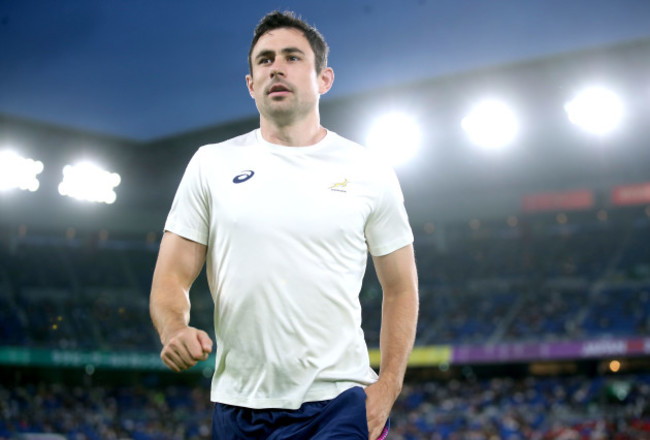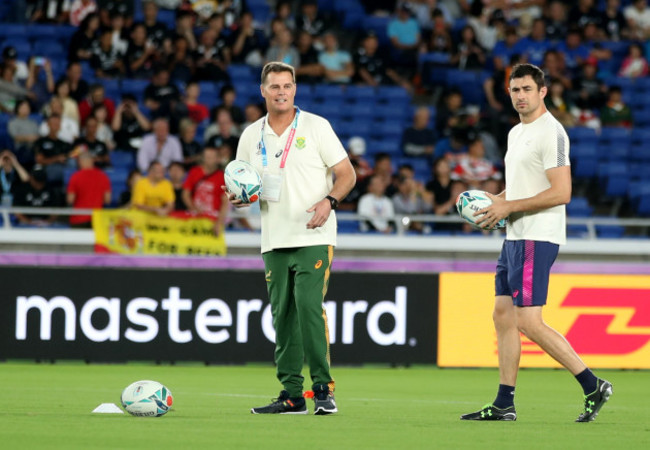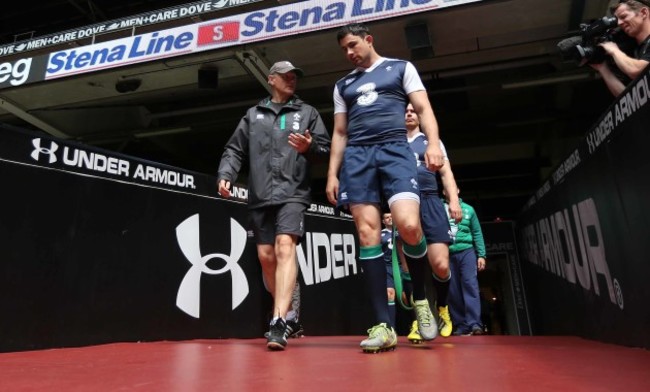LAST UPDATE | 29 Oct 2019
FELIX JONES’ PERSONALITY meant he was always likely to have something to offer the game after injury cruelly forced him to retire from playing at the age of just 28.
He was a player who worked relentlessly hard to unearth the tiny details that could help him to produce better performances. Jones worked tirelessly to analyse his game and pick out ways to improve.
The Dublin native was fascinated by how the various parts of his teams fitted together to deliver success.
Even away from rugby, he’s interested in how great structures are the sum of their parts. One of Jones’ final-year projects in his degree in Classics and Geography at UCD was about the development of Greek columns.
Jones had plenty of athletic talent, of course, but his success as a player was as much based on his work ethic and utterly maximising his potential. Now, his burgeoning coaching career is founded on the same traits.
The 32-year-old is currently helping South Africa to prepare for Saturday’s World Cup final against England, having been brought on board by head coach Rassie Erasmus just before the tournament.
Contrary to widespread belief, Jones’ role with the Boks is not that of attack coach.
Jones is instead carrying out detailed analysis on opposition individuals and defensive structures, providing Erasmus and his fellow former Munster coach Jacques Nienaber with a greater level of information about who and what they will be facing.
The Springboks players, many of whom probably didn’t know who Jones was when he joined the set-up, have been impressed by his work-rate and passion for the game, as well as his technical knowledge.
Erasmus has praised Jones for his in-depth contributions before the games against Italy and Wales, whose players the Irishman had knowledge of from his own time as part of Munster’s coaching team, a stint that ended in June after he turned down a new contract.
Jones would not claim any big role in the Boks’ progress to this World Cup final nor is he seeking any praise. Indeed, repeated visits to the South African team hotels in Japan during this World Cup have left those seeking interviews with Jones empty-handed so far.
He hasn’t been spotted away from match days – when he sits behind Erasmus in the coaching box, where they have exchanged a fair few high fives – and it was always unlikely that Jones would agree to speak publicly.
He has little interest in the media side of things, instead caring solely for the rugby. Jones is probably also aware that Irish journalists would ask questions about Joe Schmidt’s frustration him joining to the South African camp and whether he had offers to stay in Ireland.
What happens next for Jones remains to be seen but to be involved in a World Cup final as a 32-year-old is a fine achievement.
Having started rugby with Seapoint RFC in Dublin, Jones stayed loyal to the club all the way through to U20 level, when he played dual-status with Old Belvedere. A highly-promising fullback, Jones won the 2007 U20 Six Nations with Ireland and went on to make his senior debut for Leinster before a move to Munster in 2009.
Jones became part of the furniture in Limerick and was a key player until a neck injury forced him into retirement in 2015, also ending his Ireland career after 13 caps, eight of those under Schmidt.
Jones moved on to study a Master’s degree in Sport, Exercise and Performance Psychology in UL but coaching was already piquing his interest.
He visited Conor O’Shea’s Harlequins and fellow Premiership club Northampton to see how their set-ups were run, while Anthony Foley was welcoming in inviting him into Munster, where Jones contributed informally to a few training sessions, impressing the players.
When Rassie Erasmus took over in 2016, Munster moved to bring Jones on board full-time and he signed a contract as technical coach, which Erasmus then upgraded to backs and attack coach on a new two-year deal in 2017.
Jones also spent a week with Schmidt’s Ireland in Japan in the summer of 2017, having maintained a relationship with the national team head coach, who was encouraging of his development as a coach, partly explaining why Schmidt was frustrated that Jones ended up with the Boks, who Ireland could possibly have met at this World Cup.
Former Munster centre Jason Holland, who is now with the Hurricanes in New Zealand, has been another sounding board for Jones.
Erasmus departed back to South Africa in December 2017 and almost immediately tried to lure Jones across, an offer Jones rebuffed. The Springboks boss was in touch several other times but Jones stayed loyal to Munster until he eventually opted to leave at the end of last season, following much speculation that the province was looking for a new senior coach to oversee its attack.
Many Munster fans were critical of Jones’ coaching of the Munster attack but it’s worth highlighting that he was implementing game plans designed and dictated by Erasmus and his successor Johann van Graan.
Certainly, Jones shares some of the responsibility for any shortcomings in Munster’s attack on the big days during his time in the role of backs and attack coach, but assistant coaches are often working with tactics decided by the head coaches.
Jones had been offered a contract extension by Munster, who were disappointed to lose him, but clearly he felt it was time to move on.
Erasmus finally got his man ahead of this World Cup, with Jones joining after assistant coach Swys de Bruin stepped down in August.
Now, at the age of just 32, Jones will be involved in the biggest game in the sport.
It will be fascinating to see what the future holds for the Irishman but for now, he most likely has his head buried in a laptop looking for any of those crucial details that could make a subtle difference for the Boks.
-First published today at 09.25













As much as I want England to win the World Cup and Erasmus to lose it, I’d absolutely love if Jones walked away with a World Cup winners medal. I know he had an offer on the table from munster and he turned it down but I can’t help but feeling he’s a loss to Irish rugby and that the IRFU and munster should have done more to keep him involved, even if it wasn’t with Munster.
@Jim Demps: really. Surprised.
Dont want to bad mouth the man, he was a great player. But tbought, he was a very poor attack coach. Herd from a source in the camp, that the players were getting depressed with the lack of invention in regards to attack play.
Do wish him well tho
@Paddy Waggon: era he’s only 32 as well, if we want to be developing Irish coaches then we need to give them a chance.
@Jim Demps: It was probably the best time for him personally to get away given he’s not tied down with family yet so the world is his oyster and a change of scenery is probably needed given how much of a target he became for the keyboard warriors. He’ll have no trouble finding himself work and there’s no way that’s the last of him coaching within the IRFU.
@Eddie Hekenui: yeah I’d hope he’ll come back in alright. As it stands there aren’t a whole pile of Irish lads in front line roles, Carolan and Duffy in connacht, Leo Cullen and Jared Payne would be about it. It’d be nice to see a few lads progress a bit and have a few more Irish lads ready to take on big roles. Rog, Davidson, Kidney, McCall are all top class coaches and the IRFU should be trying to get them employed at home.
@Jim Demps: I don’t see the need to have them all employed in Ireland. That just creates a closed loop. Far better to have them start off here, earn their spurs and then head off to wherever they can get jobs to experience different ideas, experiences and cultures. Then they can take all that knowledge and bring it back to Ireland. Them moving on also clears space for another young coach or two to move up the ladder.
@Jim Demps: Hugh Hogan is doing a good job at Leinster. He gained most of his knowledge in the AIL, good to see coaches from that level stepping up. Can see him continuing to progress.
@Eddie Hekenui: yeah that’s fair enough but the Irfu haven’t seemed too interested in bringing lads back yet. Of the last few high profile jobs in the country I’d love to have seen how many of the Irish lads I mentioned were spoken to by the IRFU. Conor o Shea is another guy who would have been a huge addition.
@Jim Demps: Well I think they have had their chance a few times with O’Shea, he took up a job with the RFU now so that’s him lost for a few more years. I’d really like to see him in the IRFU Management side of things rather than coaching, he does a good job on the field but I think he’s strategically better than most people think and his role with the Olympic Team GB prior to London shouldn’t be overlooked either. Is there an Australian out of contract in two years which Conor might be good at???
@ThatLJD: I think that’s be the ideal situation, having o shea in for nucifora. Conor has shown time and time again that he’s one of the best rugby administrators out there and it’d be great to have him running the show.
@Eddie Hekenui: yep. Rog gaining massive experience
@Jim Demps: I heard from a source? Yeah right
@Chris Tobin: fellas get too excited on here when they see me comment. Don’t even have to say anything anymore to trigger lads
@Chris Tobin: yeah, I’d also question the insistsnce that players became depressed by tactics. It should have told the commenter all they needed to know about their source.
@Eddie Hekenui: married, mortgage and 2 young kids. That’s about as tied down as you can get.
@Joe O’Doherty: Not really. Much harder to move when kids are older and you’re thinking about schools etc. You never hear coaches talk about mortgages etc when it comes to jobs but you hear them talking about their kids all the time.
Delighted for Felix. Contributed so much to Munster. He will be the first Irish man to win a rugby World Cup medal. Will it be gold or silver?
@Ivan O’Riordan: Kyran Bracken in 2003
@Eoin Jaypee: Wouldn’t be calling Bracken an Irishman. Lived his whole life in England.
@Eoin Jaypee: A couple of other candidates
Stephen Moore – Silver in 2015 – has strong Irish connections
Two Irish parents. Lived in Tuam for 5 years. Not born in Australia (not here either though).
John Gallagher from the 87 NZ team was similar and won the tournament. Born to two Irish parents in London before they emigrated to NZ, but I don’t think he ever lived in Ireland
@Chris Mansfield: Gallagher played for Ireland a back in the day too
@Chris Mansfield: Father from that great rugby stronghold ….Limerick City!!
@Ardmore02: and yet the Duke of Wellington can be considered Irish too. Different countries have different rules.
All his famous attacking expertise was really on display last Sunday.
@KH: Obviously worked better than Schmidt’s !!
@KH: Not Jones gig as he’s not the attack coach.
@KH: so quick to throw in a negative comment that you forgot what his role is.
@KH: made a right fool of yourself there kid
@Timmy O’Toole:
Dont worry @KH just look at the posters that are hitting at you .
@Martin Quinn:
He is a good guy, talked to him when he was up in Leinster and him and some other coaches dropped over to our club:: Down to earth and knew his stuff !!! Very happy for him as this could be a good thing to have on your CV.
As stolen from the internet….the moment you realise Matt Damon has won more world cups than Ireland.
Sad but true.
Good luck to Felix.
@Hirrison Mirk: you understand how movies work right?
@Dave O Keeffe: and France Scotland Wales and Argentina. Not just Ireland
@Dave O Keeffe: they act as a distraction from our World Cup campaign?
Absolutely delighted for Stephen Jones. I hope he gets a winner’s medal in Japan. It is fantastic that we have so many young Irish coaches going overseas to gain experience outside of the Irish model and bodes well for the future. I would love to see a structure in place that got them spending some time working in school rugby.
@Mr. Common Sense: Stephen?
@Ivan O’Riordan:
Lad read the page for God sake
FELIX JONES
Every time you want to praise England your reminded of how much of a foul, smug, little odious man Eddie Jones is.
Was going to support England, as the Northern Hemisphere team, in Saturday’s RWC final. But this bolt-from-the-blue revelation of a young Irishman, former International, being so closely involved behind the scenes with the Springboks has left one in a serious but very short-term dilemma.
Go Felix!
Hon’ the Boks!
Great experience for him.
Well deserved, especially after the way he was treated at Munster. They could regret that.
@Tom McGirr: Explain to us how he was treated at Munster please?
It’s such a shame that Felix had to retire from playing so young. He could easily be backup up to Bob until next RWC.